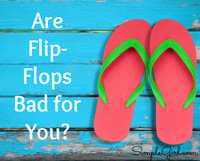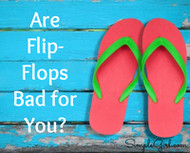Are Flip-Flops Bad for You?
Posted by Simple Girl on 11th Jul 2015

You can't throw a rock in the summertime without hitting someone who's wearing flip-flops, and you can even hit two or three with one stone on most hot, sunny days. In fact, I am guilty of almost exclusively wearing these during the summer, which is why I wrote this blog! Flip-flops, which were widely known as "thongs" before women started wearing a string for underpants, are extremely convenient for the pool or beach, and they're great for slipping on in a hurry to run out and check the mail or move the sprinkler.
But if you wear these barely-there shoes as your primary walking wear from May through September, your feet may be in for serious trouble down the road, or sooner. Whether they're the $1.99 version you can find at any discount drug store or the $620 crocodile-embossed version sold by Neiman Marcus to people who can't think of one single better thing to do with six Benjamins, flip-flops are bad news for your puppies, and here's why.
They leave your feet exposed to nasty stuff. When you walk around with the equivalent of a quarter of a shoe on each foot, your tootsies are exposed to bacterial, fungal, and viral infections, especially if you wear them in public, and in spades if you have visible cuts on your feet or microscopic wounds from exfoliation during a pedicure.
Common conditions afflicting naked feet walking through filthy places include the human papillomavirus, or HPV, which causes warts; Staphylococcus-induced infections like boils, impetigo, and cellulitis; and athlete's foot, a painful and itchy fungus that's highly contagious.
They make you slow and clumsy. Have you ever tried to run for your life in flip-flops? It looks more like "sorta loping along" for your life. Whether you're running after the bus or you were suddenly challenged to a foot race down the sidewalk, wearing flip-flops is gonna slow you down, and chances are, you're gonna get hurt. A study by researchers at Auburn University found that people who wear flip-flops take smaller steps than those wearing sneakers, and those short strides increase your risk of tripping or stubbing your little toe on the rough pavement. Ouch.
They ruin your heels. The lack of cushioning and support of flip-flops means that your heels are hitting the ground with a lot of force, which can damage the connective tissues that run from heel to toe. The resulting heel pain, which feels like your heels are being stabbed by teeny tiny needles or burned with teeny tiny flames, can be excruciating.
They cause nasty blisters. Flip-flops with hard plastic straps in particular, but any kind of flip-flop strap in general, can cause blisters resulting from the incessant rubbing of the straps against the skin of your feet. Any kind of wound on your feet — especially when they're exposed to the elements — leaves you highly susceptible to infections caused by bacteria, viruses, and other pathogens. Plus, blisters hurt like hell.
They damage your toes. When your toes have to scrunch up and dig in with each step just to keep your flip-flops on your feet, you're at a higher risk of developing hammertoe, which is a painful (and wholly unattractive) condition marked by a permanent, exaggerated bend in the knuckles of your toes that typically requires surgery to correct. Corns and calluses like to form on top of and between the hammertoes, adding to the pain and upping the "ick" factor.
They cause overuse injuries and bad posture. The total lack of support offered by flip-flops leads to poor posture due to altered biomechanics, or the movements and structures of the body. This lack of foot support also requires your joints to overcompensate, which can cause overuse injuries like Achilles tendonitis and pinched nerves anywhere along the route between your heel and your back.
Do Your Feet a Favor
Save the flip-flops for the pool and the beach, and wear shoes that offer more support — like Tevas, Birkenstocks, or even your pretty, strappy sandals — for your day-to-day galumphing around. Your feet will thank you by continuing to work hard to support all your weight and get you where you're going without constant pain and hideous wounds.
Are you a constant flip flop offender? :)

